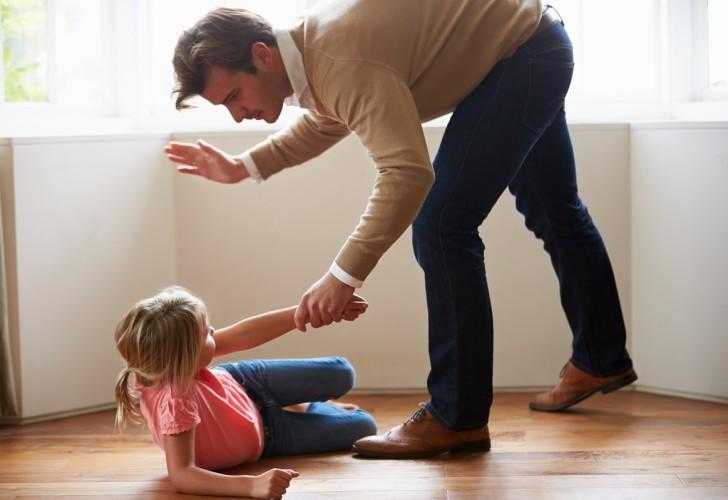Few people can say with confidence that raising children is an easy process. Despite the fact that almost every parent these days is aware of the negative effects of physical punishment, there are people who stubbornly hold the opposite point of view. In this article we will find out why you can't hit children on the hands, head, face, and we will also tell you why physical punishment is dangerous.
Punishing children with a belt
Unfortunately, for many parents in certain situations, the belt is a kind of lifesaver. A Is it possible to hit a child with a belt?? Yes, with the help of this item you can easily calm the baby and in subsequent cases you just need to show the belt and he will quickly calm down. But can good, strong and warm family relationships between parents and children be built in this way? Naturally not. Undoubtedly, such methods can achieve an effect, but only temporary. What will happen when the baby grows up and stops being afraid of a strict parent? It is unlikely that he will treat you with respect and understanding. Therefore, in order to avoid such disastrous consequences in the future, mothers and fathers should now think about the correctness of their parenting methods.

Many parents make the excuse “at one time I was raised with a belt, and nothing is wrong - I’m alive and well and nothing will happen to my child.” But tell me, do you remember such moments with warmth and love? How did you feel at the time when your parents were “diligently” raising you: betrayal, pain, disappointment? Would you like your child to experience the same? Most likely no. And besides, each child is an individual and you cannot be completely sure that he will normally survive this type of punishment.
Hitting children on the butt with a belt- this is not a way of education, but one of the types of humiliation that undermines trusting relationships in the family and is characterized by disrespect for the child’s personality.
Psychologists say that it is unacceptable to hit children. Komarovsky E.O. is also not a supporter of such methods. To learn more about the opinion of the doctor and other specialists, we suggest you watch this video:
Punishing children on the bottom
Who among us was not punished on the butt as a child? Probably everyone. But this in no way means that you need to try the same model of education on your fidgets. Why? Let's think logically. The kid did something wrong, the angry parent begins to spank him on the butt, saying “I’ll show you now and explain it in the best possible way, you’ll get it from me.” Tell me, what can the little fidget learn from this situation? He will simply understand that dad or mom is stronger than him and can show his strength at any moment. But, spanking children the conflict does not exhaust itself, but, on the contrary, provokes the emergence of another crisis in relations. Therefore, parents need to understand that force is not the best way to deal with children's disobedience.

Plus, experts have proven that you can’t hit girls on the bottom. In the future, this may negatively affect the baby’s reproductive functions.
If in a certain situation a parent could not resist and spanked the baby on the bottom, psychologists recommend smoothing out the conflict as soon as possible. Explain that you didn't mean to hurt him, you were just angry and lost control.
Should I hit a child on the bottom?? The following video will help you understand why this should not be done:
https://youtu.be/ZdzbzuBkr1s
Is it possible to hit a child's hands?
For many parents, slapping their children’s hands is already a reflex: if the baby reaches for an outlet or dangerous objects, the blow will not take long to arrive. Where are the words and explanations? No, a parent's "don't" doesn't count. Children don’t understand why they can’t, they wonder what will happen if they try to touch the socket. Understand that the baby is developing, he is attracted to everything, even what is forbidden. And the prohibitions arouse even greater interest in exploring this or that object. Only by arguing for the established prohibitions can we achieve children's obedience.
All parents know that by developing the fine motor skills of the baby’s hands, his speech apparatus is simultaneously improved. Not only does beating destroy the emotional-cognitive process, it can also cause a slowdown in speech development. This is why you should not hit a child’s hands. Does your baby not speak for a long time? Reconsider your parenting methods.

MIs it possible to hit a child on the lips?
The famous psychologist D. Karpachev claims that parents use physical force on little fidgets for only one simple reason - the baby cannot fight back. Of course, if the little one said something wrong, why have a conversation explaining why he is wrong, you can just hit him on the lips and that’s all, as they say, in the bag. How long will it last? Have you ever wondered how much a blow to the lips can hurt? Such actions on the part of loved ones greatly humiliate and offend children. What can I say, none of the adults will like it when such radical methods are used in communicating with them.
Most often, parents choose punishment such as hit a child on the lips, as a result of the latter’s pronunciation of obscene words. In this way, the mother re-educates and makes it clear that you can’t talk like that. Let's figure out what swearing is and why children love it so much. Swearing is part of colloquial culture, everyone knows about it, but only some people use it in communication. The baby grows, develops and learns all aspects of this world. The time will come when he will hear words that are still unfamiliar. The first reaction of every fidget is to repeat the expression and share their new knowledge with others. And it is quite normal when your child tells you about his affairs, this is a sign that he trusts you. Under no circumstances should you beat him for this. Never. Not only will the baby stop trusting you, he will grow up to be a fearful, insecure, irritable person. It is unlikely that a good parent wants such a future for his child.
After watching this video, you will understand why many parents beat their children and find out what reasons motivate them to do this:
https://youtu.be/IzI0IgCqjT0
Why you shouldn't hit a child on the head
Not only is this method of education completely unacceptable from a psychological point of view, it can also harm the physical health of the baby. The head is the most important and weakest part of a child's body. The skull of children is still very fragile, so you should not hit a child on the head, as even a minor blow can cause serious developmental problems.
This “method of education” can lead to such serious consequences as visual impairment, deterioration in the development of the speech apparatus, the development of memory problems, and more.

Blows to the head or face can cause rupture of cell membranes and damage to the vascular walls of the child’s brain, which in the future may lead to:
- complete loss of vision and hearing;
- mental retardation;
- epilepsy;
- paralysis
Why you shouldn't hit children in the face
You cannot hit a baby in the face, as well as in the head, for similar reasons. From the psychological side, this type of punishment is an acute form of physical insult and humiliation, especially if the blows are inflicted by the hand of a loved one. If such a process of education takes place on the street or surrounded by people, the negative consequences increase. Hit to the face has a bad effect on the psyche of a little fidget and in the future, when communicating with his peers, the child will use a similar model of relationships. A parent is a role model and, as they say, “what goes around comes around.” Therefore, the answer to the question “is it possible to hit a child in the face?” will be an unequivocal no.
Every self-respecting person will not humiliate and insult children with words or assault. Of course, this is a personal matter for everyone, but if you want to raise a confident, responsible, kind and balanced person, you should abandon the physical method of education.
Useful video
We invite you to watch a video in which a famous psychologist discusses whether it is worth using physical punishment children, and also reveals the consequences of such educational work.
What do you say about education through corporal punishment? Most likely, you will be strongly against it. Let's turn the pages of history and look at how our ancestors raised their children. Beating at that time was the norm and even the rule of good upbringing. As a result, we see that in those days obedience was not just a word, and even contradicting parents was considered rebellion and happened only in exceptional cases. In those days, whims were unheard of. So, is the “stick” a good method, and is it better than the modern “carrot”? It is the question of the appropriateness of corporal punishment that we will examine today.
Not long ago, physical punishment of children was commonplace.
Psychological aspect
Before we start the conversation, let's look at the statistics. About 95% of respondents, when asked whether their parents beat them in childhood, answered in the affirmative. More than half of them, namely 65%, added that these punishments brought them tangible benefits.
Let us now move on to consider the influence of physical punishment on the child’s psyche. Psychologists, as well as all other sensible people, are convinced that a child will never find a reliable defense against such a weighty “argument”. With the goal of forcing the baby to do something, bypassing his endless whims and harmfulness, the parent, using force, will solve it very effectively.
Everything works, but here the question arises that the cause of the bad behavior has not been clarified and eliminated. Thus, we get only a short-term effect. Dr. Komarovsky also speaks about this. To regularly fulfill your requests and demands, you will have to resort to violence all the time. Is constant beating not part of your plans? Remember that the child is afraid of punishment only the first few times, then he gets used to it and only becomes more and more embittered against you. The desire for revenge, based on resentment and pain, grows.

 Most often, after a breakdown, the parent develops a feeling of guilt towards the child.
Most often, after a breakdown, the parent develops a feeling of guilt towards the child.
Parents, as a rule, in most cases strongly repent after each breakdown. Their sense of guilt is growing, because they raised their hand to a small and completely defenseless person.
The most important advice on how to control anger and assault: when you feel like you are about to lose your temper, quickly run out of the room, breathe deeply several times, count: 1, 2, 3, 4... and so on. Help yourself in any way you can to avoid another beating.
Science versus beating
From a scientific point of view, the question of the advisability of using physical punishment for educational purposes has been considered more than once by scientists. Professor Murray Strauss, who teaches at the University of New Hampshire, argues that children whose parents beat them as children have lower levels of intellectual development (IQ) in adulthood. Grown-up children whose parents tried to look for alternative options and methods of education have higher rates.
Are we really, without wanting it, introducing a “fad” into the child’s psyche about his low self-esteem, giving him self-doubt, and reducing his mental abilities? Are we really inviting fear and pain to replace confidence and intelligence? We see that children study poorly and think slower than their peers, we reproach them and punish them for every bad mark, but this only aggravates the situation.

 A child who is subjected to physical punishment grows up insecure and withdrawn
A child who is subjected to physical punishment grows up insecure and withdrawn Law against beating
About 13 out of 100 people participating in an independent survey pointed to the fact that the problem of domestic violence should be not only internal, personal, but also social. These issues should be dealt with by special bodies monitoring the observance of the rights and freedoms of the child. Such services should come to the rescue of a defenseless person who does not yet have sufficient strength of his own to resist the threat. It is always easy to punish the weak. In the legislative system of any country, you can easily find a clause that states that any violence against children must be prosecuted by law, even to the extent of deprivation of parental rights.
Remember, hitting a child is prohibited from a moral or legal point of view. Not a single part of the body is designed for violence - not the back, not the butt, and especially not the head! This is the law!
Seeing a hysterical fit in a 3-year-old child and feeling that only a spank can bring him back to reality, do not rush to do this. Remember that you can always find other methods of influence. For example, use this: sit the baby on your lap and hug him tightly. Give him the opportunity to calm down in your arms and come to his senses. After some time, you will be able to talk to him calmly.

 You can help a child get out of a hysterical attack with love and understanding.
You can help a child get out of a hysterical attack with love and understanding.
When deciding for yourself whether to punish a child physically or not, and not finding convincing arguments that such actions contradict all possible principles - moral, mental, and legal - answer yourself this question: what can give rise to violence (we recommend reading:) ? Answer yourself honestly: nothing but violence.
Consequences of assault
Let us emphasize again: never hit a child! Compare the situation when someone hit you. How will you treat this person? How is the child different in this case? Yes, practically nothing. The mechanism for perceiving the situation is the same. Still just tiny, the kids already harbor in their little heads the dream of revenge on their parents. They cannot cope with adults yet, so they switch to easier targets: younger comrades, animals. It is terrible to understand that the wrong behavior of parents towards their children can ultimately give birth to the country of new maniacs, murderers, rapists and sadists. Most of these monsters were at one time victims of excessive domestic violence.
Why can't you hit children? As soon as you hit the baby, he immediately understands that:
- it is possible to hit the weak;
- parents are unable to cope with children's pranks;
- assault is a great way to solve all problems;
- the closest people (parents) cause fear, you need to be afraid of them;
- The child does not have the physical ability to respond to the offender.

 Due to the inequality of power, the child simply cannot respond in kind to the offender
Due to the inequality of power, the child simply cannot respond in kind to the offender Despite the fact that 67% of parents surveyed speak negatively about the use of physical punishment for educational purposes, they still periodically spank their children. Often parents raise their hand against a weak toddler because of their own powerlessness. They cannot convey the word “impossible” to the little one in any other way. Hitting the butt seems to them the most effective way. No, it shouldn't be like that. Anyone can understand a tired mother, exhausted, irritated and frustrated, but none of the listed conditions justifies spanking and slaps in the face of her beloved baby. Feeling that you are about to lose your temper and lose your temper, begin to act: count to 10, breathe deeply, go to another room, hit a pillow, try different ways to eliminate anger. Do your best, but don't let yourself hit the weak.
What to do?
We have already mentioned that bad deeds, harmfulness and whims are only consequences, and the reason lies in something completely different. What? It will seem strange and banal - the desire to be seen and heard.
The baby wants to get our attention at any cost, so give him that attention. Walk and play together more often, hug and kiss more often. You will see how correctly you are acting: affection and care can melt the coldest ice of the heart.
What to do when you have exhausted all verbal arguments? What to do if you absolutely need to convey to your child that his actions are wrong? Silence is not an option, but trying to change the situation can be a good method.

 Joint leisure strengthens family relationships and increases the level of trust
Joint leisure strengthens family relationships and increases the level of trust Learn to make compromises
Situation: you are tired and want to sleep, but the baby still won’t calm down. You tried everything to calm him down: requests, threats... It seems that he is doing everything on purpose to annoy you. A little more and you will lose your temper... Stop! Imagine in the place of your 4-year-old toddler an adult - your friend the same age. He wants to have fun and make noise, while you are already mortally tired and falling off your feet. Are you going to spank him or, worse, flog him with a belt? Most likely, you will try to find another way to negotiate. You will either go to another room yourself, or ask him to leave, citing your own fatigue. Try the same methods with your baby. It may turn out that the baby just misses you, then the surest remedy is a strong hug and a sincere conversation.
The second situation: the child offends other children on the playground and may hit them on the head with a spatula. Step aside with him and talk to him calmly but firmly, explaining that you will go home now, since he does not know how to play well with others. Also tell him that you will do this until he learns good behavior. Seeing that even after your conversations the baby continues to do bad things, know for sure that he is doing it out of spite. This is how he wants to get your attention.
Give yourself the opportunity to be real
The scale of negative emotions from your child’s pranks and pranks will soon reach the boiling point. You fight with yourself, try not to scream or get angry, but still, having reached the limit, you cannot cope and again beat your little blood (we recommend reading:). After this, you reproach yourself, scold and blame. Not worth it. The best option is to talk to your child and explain why you did what you did.

 If an adult made a mistake, you can directly tell the child about it
If an adult made a mistake, you can directly tell the child about it Conversations can be had at any age. It doesn’t matter how old the baby is now - one, two, three years old or 10 years old. Don't be shy about your anger and irritation, let your baby know about them. Don't strive to be a perfect mother, be lively and natural. Call a spade a spade: “I was terribly angry with you because...” Always back up your words with explanations. By freeing yourself from the need to accumulate anger and anger, and by learning to talk about it with your child, you will see for yourself that the need for punishment will disappear by itself.
Find the root cause within yourself
If you begin to regularly and methodically spank your little one for any offense, but for serious offenses you can spank him severely, there is a clear problem. Of course, not a child’s room, but your personal one. Being in a difficult emotional and mental state, the parent is constantly tense and irritated. With punishments and spanking, he takes out his anger and relieves stress. Most people who beat children were beaten themselves as children. They don’t see anything wrong with beating: we were punished with a belt on the butt, and we will be punished too. Realizing that his parents’ tactics towards the person were wrong, he keeps shielding them, proving to those around him and to himself that beating is useful. Such parents may hit their child on the lips in the heat of anger for some impudent word addressed to them.
In such situations, the surest way is to get rid of childhood psychological trauma. If you don’t see the reason for your anger and frequent use of corporal punishment, consult a psychologist. The science of psychology will help in this case to identify the root cause and eliminate it.
The main assistants in the matter of education, namely humane education, are patience and boundless love. Raising children is a lot of work and not easy, but all problems and difficulties can be overcome. Seeing the negativity from the toddler, do not rush to conclusions. It is important to find out the reason for this behavior. Don't forget that each age has its own characteristics and needs that need to be listened to.
A person who has barely been born should already appear before you as a full-fledged personality. You cannot perceive him as a weak and subservient being who fulfills all your demands and desires without complaint.
Corporal punishment leads to the fact that the baby becomes scared, embittered and morally humiliated. Do not allow yourself to destroy the trust that exists between you and your child. Beating awakens feelings of hatred in him, and this will only make his behavior worse. Following this, new punishments will come. Stop this vicious circle. Don't let your child lose his self-esteem.

Parents constantly wonder whether physical punishment should be used on children? Psychologists and doctors are discussing this topic today, and the state is trying to protect children from aggressor parents. If you are also raising a child, then you have probably encountered difficult situations when you just want to use the strap. This happens to everyone, but not everyone is able to resist. “Popular about health” invites you to figure out why you shouldn’t hit children on the butt, arms and head. Why are physical punishments dangerous? What impact will they have on the younger generation in the future?
Why parents are ready to pick up a belt?
Even the most loving and loyal parents often simply cannot restrain themselves from spanking the tomboy. Their feelings can be understood - little “testers” taste everything, test their strength, exposing themselves to danger. Starting from the age of three, children are already able to show their character; they can be stubborn, obstinate, rude, and some are completely uncontrollable. Adolescence is also difficult. At this time, boys and girls are generally more susceptible to the influence of their peers; their parents’ word means almost nothing to them. If you try to give advice, you can run into rudeness. Teenagers often manipulate feelings, show selfishness and are prone to maximalism. It can be difficult for mom and dad to cope with such difficulties. This is why there is a strong desire to spank the child. But is this the only reason for aggression? No, often their root lies deeper:
1. Fathers and mothers beat their offspring because they themselves were raised to be aggressive.
2. Adults take out their anger and their complexes and failures.
3. Parents do not have time for quality education and long conversations with their child.
4. Moms and dads simply don’t know how to approach their children.
5. Adults are mentally unstable, they need an emotional shake-up and use the child to satisfy this need.
Contrary to the belief that only alcoholics show aggression towards children, statistics indicate the opposite - completely sane mothers and fathers also beat their children. Why shouldn't you touch children?
Why you shouldn’t beat children at all – a psychologist’s opinion
Hitting children is dangerous not only because it can harm their health, but also for other reasons. Aggression can lead to mental disorders in children and adolescents. In the future, they will grow up insecure, weak and dependent on the opinions of others. Such people are unlikely to succeed. So, let's discuss in detail the consequences that corporal punishment of children will lead to:
1. Physical punishment of a child is an interference in his personal space, and an unwanted one. By using spankings and belts, mother and father prevent the formation of a valuable skill - the ability to defend the boundaries of one’s own space, one’s “I”. In the future, such a child, upon becoming an adult, will be too dependent on the opinions of others.
2. Aggression from relatives negatively affects the formation of trust in others.
3. The use of physical force on children humiliates them, deprives them of self-esteem, which means that subsequently they will not be able to objectively evaluate themselves and will not learn to show initiative and perseverance.
4. Toddlers and teenagers learn aggressive behavior by watching their moms and dads. In the future, they will solve their problems in the same way.
5. Faced with cruelty at home, as children grow up, they will subconsciously choose a life partner who will show aggression towards them.
We looked at how parental aggression affects the psychological state of their children. Now let's see what harm moms and dads can cause to children physically if they use force on them.
Why you can't spank your butt hard?
Blows delivered to the “soft spot” only seem harmless. Even if you don’t hit with full force (note that it is quite difficult to control yourself in the heat of anger), you can damage the baby’s kidneys, which are located just above the buttocks. By slightly miscalculating the effort, a father or mother can cause internal bleeding in a defenseless baby or damage the lower spine.
Why can't you hit children's hands too??
Even simple slaps on the hands because the baby is reaching into an outlet or putting dangerous objects in his mouth can cause harm. The hands are closely connected with the speech center. It’s not for nothing that children are recommended to develop fine motor skills to develop speech. Hitting hands means causing problems with the speech apparatus. Therefore, you cannot hit children on the hands!
Why don't they hit a child on the head??
The head is the weakest point. The skull of babies is still quite soft and vulnerable. Even a slight push or blow can lead to serious consequences - disturbances of the optic nerve, speech center, memory, problems with associations and logic may arise. Hitting someone on the head is extremely dangerous and can lead to disability. For the same reason, you should not hit children in the face. Even shaking a child by the shoulders can lead to damage to the baby’s brain - rupture of cell membranes and vascular walls. The consequences of such actions are sad:
Loss of vision or hearing;
Epilepsy;
Mental retardation;
Paralysis;
Speech disorders.
That is why you cannot “knock” on the head in any way.
It is absolutely forbidden to beat children, even if you do not have the strength to tolerate their antics. It's better to stop for a minute and leave the room to calm down, and then talk. Use punishments in the form of deprivation of pleasures - cartoons, sweets, communication with peers (for a teenager), but do not use force.
He drives his parents crazy; spanking him is not considered shameful. But, as recent discussions show, bad behavior among schoolchildren also forces parents to use physical punishment. Yes, the child is already big, yes, this is not pedagogical - but what to do? This is what French psychologists and parents think on the topic of “to hit or not to hit.”
In October 2013, an event occurred in France that was written and talked about by all the media: a 44-year-old man was sentenced to a fine of 500 euros for taking off his 9-year-old son’s pants and flogging him. His ex-wife filed a lawsuit: after the divorce, the boy spent part of his time with his mother, part with his father.
For France, such a sentence is an extraordinary phenomenon: the law punishes cruelty to minors, but spanking on the soft part does not apply to them. But among the French there is no general opinion on this issue: 87% of them have spanked a child at least once, a quarter have given a slap, and 10% even have to use a whip! (According to the Union of European Families, 2007.)
In 1946, 43 years before the adoption of the International Convention on the Rights of the Child, Françoise Dolto wrote: a small child should not be placed in a corner, but can be punished with a short blow to the arm or leg, so that it is not the child “as a whole” who is punished, but the “offending part”; if the child is over 8 years old, do not slap or spank him; In no case should you take away a child’s personal belongings as punishment or deprive him of food, especially in public, for example, dessert at the table; never delay punishment: this develops a sense of guilt in the child, instead of freeing the conscience.
To spank or not?
However, many French parents think that a spank on the butt cannot be considered corporal punishment.
Veronica, a mother of two girls (Juliette, 3 years old, and Valentin, 11 months old), admits: “Before the birth of my second child, I was categorically against corporal punishment. I don’t hit children, of course, but sometimes I spank the older one when she makes the little one cry. It’s hard with two children, I’m tired, I don’t have enough time for the eldest, I often lose my temper and spank the girl just automatically. I don’t like this at all, and I would like to find some way out.”
Psychotherapist and author of many books I. Fiyoza comments: “One of the consequences of such spankings is that the child gets the impression that problems can be solved with violence. Children who are spanked by their parents are more aggressive and more likely to have difficulties in school. Psychologists and psychotherapists have long noticed this.
But now we know exactly what is going on in the minds of these children. This is fear and shame. And it also stimulates the amygdala, which is responsible for stress. And the child’s entire body comes into this state. And the child no longer knows how to react to fear. If he is spanked often, he becomes desensitized to this punishment. His fear simply disappears. “You can do whatever you want, I don’t feel anything, I’m not in pain, and I’m not afraid.”
If this happens very rarely, if the parent then asks the child for forgiveness and explains to him (“you ran across the road without looking around, and there was a car there, and I was very scared for you”), it’s not scary. Unless it’s the kind of slap that then makes the child’s head buzz... But if slaps and slaps become regular, the child no longer trusts either his feelings or the parent who spanks him, and this breaks their connection, their affection .
Even the threat of a spanking should be avoided. If you shout “you’ll get it from me now,” the child becomes aggressive, and the parent thinks that the child is provoking him. He thinks: yeah, you really want a belt, so you'll get it. And spanks the child. And the child even feels some relief - after all, he is no longer threatened...”
Did you feel like your hand was ready to slap you in the face? Stop. If the child is already big, leave him and go outside; if he is small, go to the toilet and close the door. The main thing is not to see the child. When you see his scared eyes, signals go to your brain, the amygdala gets excited and needs to be calmed down in order to gain the ability to think. There are many more tricks: inflating a balloon, drinking a glass of water, drinking water through a straw, etc. After all, the problem is that when we start yelling or fighting, we teach the child: if you are angry, then screaming and throwing up your hands is the right thing to do. If we show how we try to cope with emotions, he will learn to keep the situation under control.
It's legal to spank
GP Gilles Lazimi is coordinating a major campaign against corporal punishment of children. He is outraged by the French: “Husbands no longer have the right to beat their wives. Owners of enterprises do not have the right to beat their employees. We have no right to beat up our neighbor. But we have the right to beat our own child, who is only growing and cannot defend himself!”
Dr Lazimi is campaigning for a law to be passed in France banning corporal punishment of children. In 33 countries such laws already exist (among them Ukraine, Kenya, Togo, Tunisia). Sweden was the first to adopt it, in 1979. In 2013, such a law appeared in Honduras.
But the French are stubborn. Of course, the Criminal Code says that beating a child is prohibited. But, according to Pierre-Brice Lebrun, a law professor, “although the law condemns violence, especially against a child - this is an aggravating circumstance, the law does not mention parents. It turns out that the law does not clearly say that parents do not have the right to beat their child. And that’s why the majority believes that they have just this right.”
In 2009, pediatrician and MP Edwige Antje introduced a bill to the National Assembly to ban corporal punishment. “Whom I love, I beat,” the French answered and... unanimously voted against (80% according to a TNS Sofres survey, 2009).
Many scientists believe that this love of spanking has historical roots, since for centuries teachers and parents “corrected” disobedient children with rods. After the French Revolution, which was perceived by many as an insult to the authority of the king, the father of the nation, a new Civil Code was drawn up. “He gave the pater familias (the head of the family - E.S.) all rights and made him the guarantor of public order,” writes history professor Ivan Zhablonka. “It’s the same story in many other Latin countries: they turn a blind eye to child abuse in the name of father’s rights.”

Punishments: what to choose?
If you don't spank, then how can you punish a child? For example, child psychiatrist Frederick Koshman suggests putting him in a corner. The most reasonable number of minutes is the age of the child (4 minutes in the corner if he is 4 years old).
His colleague Gilles-Marie Valet continues the thought: “I do not recommend depriving a child of something that plays a useful role in his development as a punishment. For example, you should not deprive your child of dessert: it is important for a balanced lunch. You should not prohibit sports or hobbies, especially if he loves them very much, as this can cause serious injury to him. But if he is banned for some time from electronic games or television (neither of which plays an important role in intellectual or cultural development), he will understand his mistake and will not want to repeat it. Punishment is a symbol. His goal is not to hurt the child (physically or mentally), his goal is to show that he did something bad, that the parents do not agree with his action and are upset.”
How to punish your child and is it possible to resort to force? This question worries many mothers and fathers who care about the psychological state of the baby. The issue of corporal punishment has long been quite controversial. Parents usually fall into two categories on this issue. The former practice spanking, the latter are categorically against it. But even those who do not believe that physical punishment is not a method, sometimes in an impulse can spank a child, explaining this with their poor self-control and frayed nerves.
The problem of why you can’t hit girls or boys on the butt contains a lot of things that strict parents don’t even think about. It is unlikely that a normal father or mother wants to deliberately humiliate their baby, or break his personality, or suppress his psyche.
Adults sincerely think that by their actions they will show their attitude towards the offense.
Is it possible to spank a child on the bottom?
When deciding whether to hit a child on the bottom with a hand or a belt, adults forget about the consequences of corporal punishment. They are very often negative. The baby begins to perceive the influence of force as a solution to the problem. And this, you see, is not true.
Parents who raise their daughter or son in this way demonstrate their disdain for the personality of their offspring. But this is already an individual person, with his own character. It is clear that children sometimes literally drive their parents crazy with various misdeeds. But here it is important not to punish first, but to understand the reason for this or that offense. Why did the daughter or son do exactly this, although they knew that this should not be done? Perhaps the child simply lacks parental attention, and he wants to attract it with his actions, at least negatively.
Another reason may be during adolescence, but during puberty, corporal punishment is generally excluded. At this time, the developing personality is more susceptible to stress, depression and psychological crises than ever before.
And then you can express your attitude towards the action of your offspring in another way. There are a huge number of them so that the child finally understands that he has made a mistake that should not be made again.
Talk to your child more. When there is a trusting relationship between adults and children, fewer problematic situations arise.
In any case, children's pranks should be treated with at least a dose of philosophy. We were all children and we all committed one or another offense that our elders really didn’t like.










